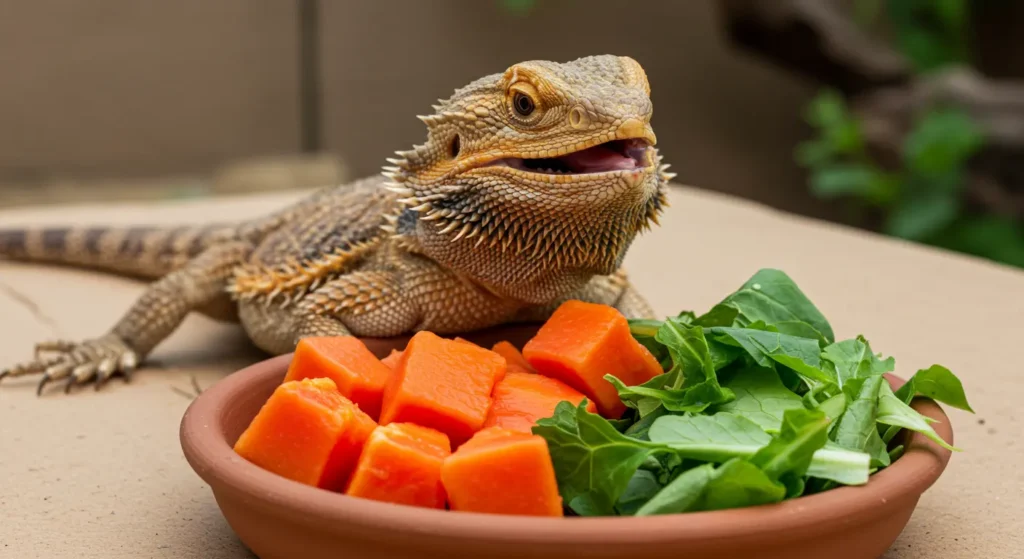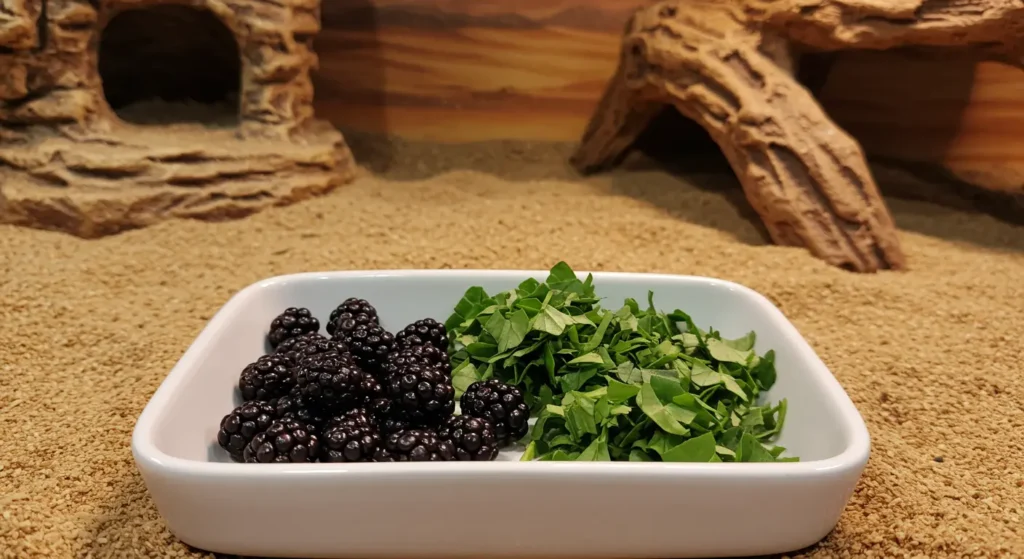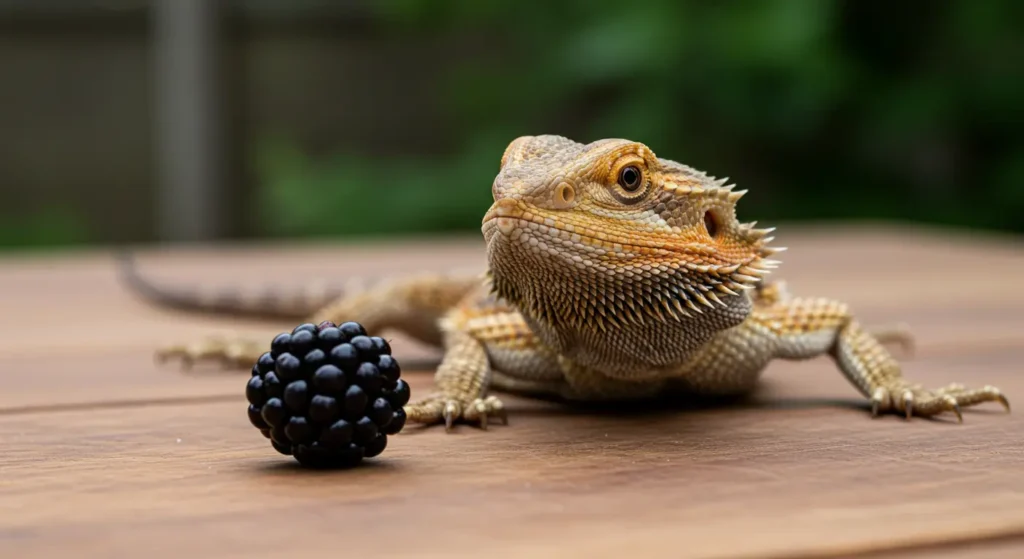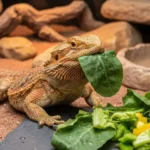Bearded dragon owners often wonder, can bearded dragons eat blackberries, and if so, how safe and healthy are they? These juicy berries are packed with vitamins and antioxidants, but not all fruits are created equal when it comes to reptile diets. So, can bearded dragons eat blackberries as a regular part of their meals, or should they be limited to the occasional treat? In this guide, we’ll break down the nutritional value, potential risks, and best practices for feeding blackberries to your bearded dragon — so you can make confident, informed choices for your pet’s health.
Can Bearded Dragons Eat Blackberries? Nutrition, Risks & Benefits Explained
Blackberries may seem like a healthy snack, but are they truly safe for your bearded dragon? In this section, we’ll explore whether bearded dragons can eat blackberries, along with the nutritional benefits, possible risks, and how this fruit fits into a balanced reptile diet.
Are Blackberries Safe for Bearded Dragons to Eat Occasionally?
Yes, blackberries are generally safe for bearded dragons—but only when fed in moderation. These fruits offer several nutritional benefits, but they also contain elements that can cause health issues if overfed. That’s why blackberries are best used as an occasional treat, not a dietary staple.
The key is to feed them sparingly, about once every week or two, depending on what other fruits you offer. Too many blackberries can upset your dragon’s digestive system due to their sugar, fiber, and water content. Over time, this could lead to diarrhea or imbalanced nutrient intake.
Feeding small, prepared portions of blackberry—alongside a balanced diet of greens, insects, and supplements—ensures your beardie gets variety without the risk. Always observe your dragon after introducing a new food. If they respond well, blackberries can become a fun addition to their treat rotation.

Health Benefits of Feeding Blackberries to Bearded Dragons
Blackberries provide a surprising mix of vitamins and minerals that can benefit bearded dragons when offered in small amounts. They’re rich in vitamin C, which supports the immune system, and vitamin K, which helps with blood health. They also contain vitamin A, important for vision and tissue repair.
These berries are also loaded with antioxidants, which help prevent inflammation and protect cells from damage. For reptiles, antioxidants may support long-term health by reducing oxidative stress.
In addition to vitamins, blackberries offer small amounts of minerals like manganese and zinc, both of which contribute to a healthy metabolism and immune response.
Because of these nutrients, blackberries can be a healthy, enriching snack—especially for bearded dragons that are active and eating well. However, their nutritional benefits are best enjoyed as part of a varied, well-balanced diet—not as a frequent or main food source.
Do Blackberries Support or Harm Bearded Dragon Wellness?
In small portions, blackberries can complement your bearded dragon’s overall diet. Their high water content—around 88%—can help hydrate your beardie, especially if it’s not drinking regularly from a dish. Hydration is critical for digestion, energy, and organ function.
The fiber in blackberries also plays a role in keeping your dragon’s digestive system regular. A little fiber can prevent constipation and support a healthy gut. However, too much may lead to diarrhea.
Additionally, the presence of vitamins A, C, and K, along with natural antioxidants, helps support immunity, skin health, and internal organ function. These nutrients contribute to long-term wellness and disease prevention.
Feeding blackberries occasionally can also stimulate appetite and make meals more engaging—especially if your beardie is a picky eater. Just remember: the benefits only apply when blackberries are served properly and not overused.
Sugar, Oxalates, and Digestive Issues in Fruit-Based Treats
Despite their benefits, blackberries also come with some risks—primarily due to sugar and oxalates. These compounds can cause problems for bearded dragons if consumed too often.
Sugar in blackberries is naturally occurring but still too high for regular feeding. High sugar intake can lead to obesity, tooth decay, or even metabolic issues in reptiles. It also increases the risk of diarrhea, which can quickly lead to dehydration.
Oxalates are another concern. These compounds bind to calcium and can prevent its absorption. Over time, this may contribute to metabolic bone disease (MBD)—a serious and painful condition in reptiles.
Fruit like blackberries should always be offered in moderation, and only as a treat—not a staple. Feeding blackberries alongside calcium-rich vegetables, and maintaining proper UVB lighting, can help minimize the risks associated with sugar and oxalates.
Feeding Frequency: How Often Can Bearded Dragons Eat Blackberries Safely?
Feeding fruit to your bearded dragon can be healthy—when done in moderation. In this section, we’ll look at how often bearded dragons can eat blackberries safely, how much to serve, and what to watch for when offering this sweet treat.
How Many Blackberries Can Bearded Dragons Eat in a Week?
Blackberries should be offered to bearded dragons as an occasional treat—not a regular part of their diet. The ideal feeding frequency is once every one to two weeks. This timing helps prevent sugar buildup and ensures your dragon maintains a balanced intake of nutrients from other food groups.
Like most fruits, blackberries are high in natural sugars and water. While they offer some beneficial vitamins and antioxidants, they lack the essential protein, calcium, and fiber balance needed for everyday feeding. Too many fruits can lead to health problems such as diarrhea, obesity, or nutrient imbalances.
Other fruits like blueberries, raspberries, and papaya follow similar feeding rules. Offer small portions, rotate them out, and never rely on fruit alone. Pairing fruit with calcium-rich greens and gut-loaded insects helps maintain your beardie’s overall health. Always remove uneaten fruit promptly to avoid bacterial growth inside the enclosure.
Can Juvenile or Baby Bearded Dragons Eat Blackberries?
Baby and juvenile bearded dragons have different nutritional needs than adults. Their diets should be more protein-focused to support growth, meaning fruits like blackberries should be fed even less frequently.
While adult beardies can handle a blackberry every week or two, baby dragons should only have small, occasional nibbles—perhaps once a month. Their digestive systems are more sensitive to sugar, and their calcium requirements are much higher. Feeding sugary or watery fruits too early or too often can lead to poor bone development and digestive issues.
If you do offer a blackberry to a juvenile dragon, make sure it’s cut into tiny, manageable pieces. Monitor closely for any signs of digestive discomfort. It’s always better to focus on gut-loaded insects and finely chopped greens for young dragons. These provide the nutrients they need for strong bones, energy, and immunity.
Best Practices for Rotating Fruits in a Bearded Dragon’s Diet
Rotating fruits is essential for variety and nutritional balance in your bearded dragon’s diet. Blackberries, while healthy in small amounts, should be part of a rotating list that includes safer, low-oxalate fruits. Examples include blueberries, strawberries, raspberries, mango, and papaya.
By changing the fruit every couple of weeks, you reduce the risk of overexposure to oxalates, sugars, or certain minerals that might cause issues if consumed too often. Rotation also keeps your dragon mentally stimulated, as they enjoy new textures and flavors.
Keep a simple feeding log or rotation schedule to avoid offering the same fruit back-to-back. This ensures dietary diversity and makes it easier to detect food sensitivities. Pair fruit days with hydration support and make sure greens and insects remain the primary food sources.
Rotating fruit treats helps reinforce positive feeding behavior while reducing long-term health risks.
Signs of Overfeeding Sweet Fruits Like Blackberries
Bearded dragons enjoy sweet fruits, but too much of a good thing can quickly become harmful. Common signs of overfeeding blackberries—or any sugary fruit—include loose or watery stool, reduced appetite, bloating, or visible lethargy.
Excess sugar can also lead to weight gain or even metabolic issues, especially in less active dragons. Long-term overfeeding may interfere with calcium absorption and lead to metabolic bone disease if paired with a poor calcium-to-phosphorus balance.
Watch closely for changes in behavior or stool consistency after feeding fruit. If you notice any problems, reduce fruit frequency immediately and re-focus on a diet rich in greens, protein, and calcium.
Overfeeding may also make your dragon picky—some beardies begin refusing vegetables if they associate meals with sweeter options. Keeping treats limited helps preserve healthy eating habits and digestive stability.
Blackberry Nutrition Breakdown: Oxalates, Sugar & Calcium for Bearded Dragons
While blackberries offer nutritional perks, they also contain compounds that can affect your bearded dragon’s health. In this section, we’ll break down the roles of oxalates, calcium-to-phosphorus ratios, and natural sugars—so you can decide how often blackberries truly belong in your beardie’s diet.
Do Oxalates in Blackberries Affect Calcium Absorption?
Oxalates are naturally occurring compounds found in many fruits and vegetables, including blackberries. When consumed in high amounts, oxalates can bind with calcium inside your bearded dragon’s digestive system. This makes it harder for their body to absorb the calcium they need. Over time, this can lead to calcium deficiency, even if you’re providing supplements or calcium-rich foods.
Bearded dragons require steady calcium intake to maintain bone health, muscle function, and overall vitality. If their diet includes too many oxalate-rich foods, like spinach or blackberries, calcium levels may drop without warning. Feeding blackberries only occasionally helps reduce this risk. It’s also a good idea to avoid combining multiple high-oxalate foods in the same meal. Balancing the diet with low-oxalate greens like collard greens or dandelion leaves can support safe calcium absorption while still allowing room for sweet treats like blackberries.
Calcium to Phosphorus Ratio in Blackberries for Reptile Health
A key part of a healthy bearded dragon diet is maintaining the right calcium-to-phosphorus ratio. Ideally, their food should have at least a 1:1 ratio or higher, with calcium as the dominant mineral. Blackberries offer a favorable ratio of approximately 1.3:1, meaning they contain slightly more calcium than phosphorus.
This makes blackberries safer than many other fruits when it comes to mineral balance. Still, the benefits can be lost if you feed them too often or pair them with high-phosphorus foods. Phosphorus can bind with calcium and prevent its absorption, leading to long-term health problems.
Even with this decent ratio, blackberries should remain a supplemental snack rather than a staple. A well-rounded diet full of calcium-rich greens, proper UVB lighting, and occasional fruit treats helps keep your beardie’s bones strong and their metabolism in check.
Can Blackberries Increase the Risk of Metabolic Bone Disease (MBD)?
Blackberries on their own won’t cause metabolic bone disease, but overfeeding them could contribute to it over time. MBD occurs when a bearded dragon lacks enough available calcium or doesn’t metabolize calcium properly—often due to poor diet or inadequate UVB exposure.
Blackberries contain oxalates and natural sugars, both of which can interfere with calcium absorption. If fed too often, they may reduce the calcium available to your dragon’s body, especially if the overall diet lacks balance. The early signs of MBD include trembling limbs, a soft jaw, and reduced mobility. These symptoms can worsen quickly if not addressed.
To avoid contributing to MBD, limit blackberry servings and ensure your beardie receives calcium supplements, UVB lighting, and leafy greens low in oxalates. Occasional blackberries can still be enjoyed—just not as a regular part of their weekly diet.
Managing Sugar Intake When Feeding Bearded Dragons Berries
Blackberries are high in natural sugar, which can be a concern for reptiles like bearded dragons. While small amounts are generally safe, too much sugar can lead to obesity, digestive issues, or even fatty liver disease in the long run. These complications reduce your dragon’s quality of life and are often preventable with dietary control.
A sugar spike from fruits may also disrupt your dragon’s appetite or cause loose stools. This makes it harder for them to get the nutrients they need from other foods. When offering blackberries, serve no more than one or two small pieces, once every week or two.
You can also rotate fruits with lower sugar content, such as papaya or raspberries, to reduce the overall sugar load. Ensuring your dragon’s diet is mostly made up of leafy greens and protein sources—like insects—will help maintain healthy digestion and stable energy levels.
How to Prepare Blackberries for Your Bearded Dragon the Right Way
Before offering blackberries to your bearded dragon, it’s important to prepare them properly to avoid health risks. In this section, you’ll learn the safest way to wash, cut, and serve blackberries to make them easy to eat and safe to digest.
Proper Way to Wash, Slice, and Serve Blackberries to Bearded Dragons
Proper preparation makes blackberries safer and easier for your bearded dragon to eat. Start by thoroughly washing each berry under cool, running water to remove dirt, pesticides, or waxes. Even organic blackberries should be rinsed well to reduce the risk of contamination.
Next, cut the berries into small, bite-sized pieces. Whole blackberries can be too large or firm, especially for younger dragons. Cutting them in half or quarters helps prevent choking and makes chewing easier.
Blackberries should be served raw, never cooked or sweetened. Place a few small pieces in a shallow dish or directly on your dragon’s salad to add variety and flavor. Avoid mixing them with other fruits during the same feeding. Serve them no more than once every one to two weeks to keep sugar and oxalate levels in check.

Tips for Feeding Blackberries to Juvenile and Senior Bearded Dragons
Juvenile and senior bearded dragons need extra care when eating fruits like blackberries. Younger dragons require high protein and calcium for growth, while seniors often need softer, easier-to-digest foods.
For juveniles, limit blackberry intake to a very small piece once a month. Their systems are more sensitive to sugar and oxalates, which could interfere with healthy bone development. Always cut the fruit into tiny pieces to avoid choking or chewing difficulties.
Senior dragons may enjoy blackberries a little more frequently—about once every two weeks—but softer fruit is best. If the berries feel too firm, mash them slightly or use ripe ones for easier digestion. Monitor older dragons for any signs of digestive upset or loose stools, which may indicate the fruit is too rich. In both cases, moderation is key.
Why Wild or Unwashed Blackberries May Harm Your Beardie
Feeding wild or unwashed blackberries to your bearded dragon poses serious risks. Wild berries can be coated in pesticides, chemicals, or bacteria that aren’t visible to the eye. They may also be contaminated by animals, insects, or harmful environmental exposure.
Even homegrown or store-bought blackberries can carry residue from fertilizers or transport conditions. If not cleaned properly, these substances can upset your dragon’s digestive system and potentially cause illness.
Unwashed berries also tend to spoil faster, especially in a warm terrarium. Mold and bacteria can grow within hours, making leftovers dangerous to eat. To prevent these issues, always use fresh, store-bought blackberries and rinse them thoroughly. When possible, remove stems and leaves too, as they may contain toxins or choking hazards.
Using Blackberry Pieces to Encourage Greens in Your Dragon’s Diet
Blackberries can be a great tool for encouraging picky bearded dragons to eat their greens. Their bright color, soft texture, and sweet flavor can attract attention and stimulate appetite.
Try placing small blackberry pieces on top of a fresh salad made of collard greens, dandelion leaves, or mustard greens. The scent and taste may encourage your dragon to begin eating, even if they usually avoid vegetables.
This trick works best when used sparingly. If done too often, your beardie may come to expect fruit with every meal and start ignoring plain greens. Rotate with other fruit-based incentives, like a bit of mango or papaya, and gradually reduce the fruit portion over time.
Used correctly, blackberries can support healthy eating habits and help introduce new vegetables without causing sugar dependence.
Better Fruit Alternatives to Blackberries for Bearded Dragons
While blackberries can be a tasty treat, they’re not always the best option for regular feeding. In this section, we’ll explore healthier fruit alternatives that are lower in sugar and oxalates but still provide great flavor and nutrition for your bearded dragon.
Safer Berries: Blueberries, Raspberries, and Strawberries Compared
While blackberries are safe in small amounts, other berries offer similar benefits with fewer concerns. Blueberries, raspberries, and strawberries are excellent alternatives for bearded dragons. They are all lower in oxalates compared to blackberries and tend to be easier to digest.
Blueberries contain antioxidants and vitamin C, and they have less sugar than many other fruits. Raspberries provide fiber and are lower in calcium-blocking compounds, making them a good occasional treat. Strawberries are rich in vitamin C and tend to be softer and easier to chew, especially for young or senior dragons.
All three of these berries should still be fed sparingly—once a week or less. Always serve them fresh, washed, and chopped into small pieces. Rotating these options helps provide variety while minimizing the risks associated with overfeeding any single fruit.
Low-Oxalate Fruits That Support Healthy Bearded Dragon Diets
Fruits with low oxalate content are much safer for regular feeding in a bearded dragon’s diet. Low-oxalate options include papaya, mango, melon, and figs. These fruits provide hydration, vitamins, and fiber without blocking calcium absorption.
Papaya is especially beneficial thanks to its soft texture and high vitamin A content. Mango offers beta-carotene and a slightly firmer texture, which many dragons enjoy. Cantaloupe and honeydew melon are refreshing and hydrating, but should be served in moderation due to sugar content.
Figs are nutrient-rich and provide calcium, though they should be fed only occasionally. By focusing on low-oxalate fruits, you can safely include small fruit servings in your beardie’s diet without interfering with calcium metabolism. Always pair fruit with calcium-rich greens to maintain balance.
High-Sugar Fruits to Avoid in a Reptile Feeding Plan
Certain fruits are best avoided in a bearded dragon’s diet due to their high sugar content. These include bananas, grapes, cherries, and watermelon. While not toxic, these fruits can lead to obesity, diarrhea, and long-term metabolic issues if fed too frequently.
Bananas, for example, are dense in sugar and phosphorus, which can interfere with calcium absorption. Grapes and cherries are high in fructose and may cause digestive upset. Watermelon, though hydrating, is mostly sugar and water and lacks meaningful nutrition for reptiles.
Feeding these fruits on rare occasions—once a month or less—is fine, but they shouldn’t be a regular part of your bearded dragon’s feeding routine. When in doubt, choose lower-sugar, low-oxalate alternatives to protect your dragon’s long-term health.
Building a Weekly Fruit Rotation Schedule for Bearded Dragon Nutrition
A well-planned fruit rotation schedule helps your bearded dragon enjoy variety while avoiding nutrient imbalances. Fruits should make up only a small portion of the overall diet—no more than 10% of weekly intake.
Plan to offer fruit once or twice per week, choosing different types each time. One week you might serve blueberries; the next, papaya or mango. This prevents overexposure to sugar, oxalates, or phosphorus.
Track which fruits you offer by keeping a simple calendar or log. Always pair fruit with nutrient-dense greens like collard, mustard, or dandelion greens. Rotate not just the fruit type, but also the day of the week, so your beardie doesn’t expect sweets with every meal.
Balanced rotation supports healthy digestion, keeps your dragon mentally engaged, and reinforces good eating habits.
Frequently Asked Questions
Can bearded dragons eat blackberries every day?
No, bearded dragons should not eat blackberries every day. While blackberries offer vitamins and antioxidants, they are high in sugar and oxalates, which can interfere with calcium absorption. Offer them only once every 1–2 weeks as a treat.
Are blackberries safe for baby bearded dragons?
Blackberries are not ideal for baby or juvenile bearded dragons. Their developing bodies need a protein- and calcium-rich diet. A tiny amount of blackberry once a month is usually safe, but protein and greens should remain the focus.
Do blackberries cause diarrhea in bearded dragons?
Yes, feeding too many blackberries can lead to diarrhea due to their high water and sugar content. Diarrhea can cause dehydration, so limit fruit intake and monitor stool consistency after feeding.
Can I feed frozen blackberries to my bearded dragon?
You can feed thawed frozen blackberries, but they must be fully defrosted and brought to room temperature. Wash them thoroughly, and avoid berries that have been sweetened or treated with preservatives.
How do blackberries compare to other fruits for bearded dragons?
Blackberries are safer than many sugary fruits due to their decent calcium-to-phosphorus ratio. However, fruits like papaya, mango, and blueberries are lower in oxalates and often better suited for rotation in your dragon’s diet.
Conclusion
So, can bearded dragons eat blackberries? Yes—but only in moderation. These juicy fruits can offer hydration, antioxidants, and vitamins, but their sugar and oxalate content mean they’re best served as an occasional treat rather than a diet staple.
If you choose to include blackberries in your bearded dragon’s menu, always prepare them safely, feed them in small amounts, and rotate with healthier fruit alternatives like papaya or blueberries. Keeping a well-balanced diet with calcium-rich greens and proper UVB lighting will do far more for your beardie’s health than any sweet snack.
By understanding the risks and benefits, you can treat your dragon without compromising their nutrition. Responsible feeding choices today help ensure a long, active, and happy life for your scaly companion.







1 thought on “Can Bearded Dragons Eat Blackberries? Safe Feeding Guide”